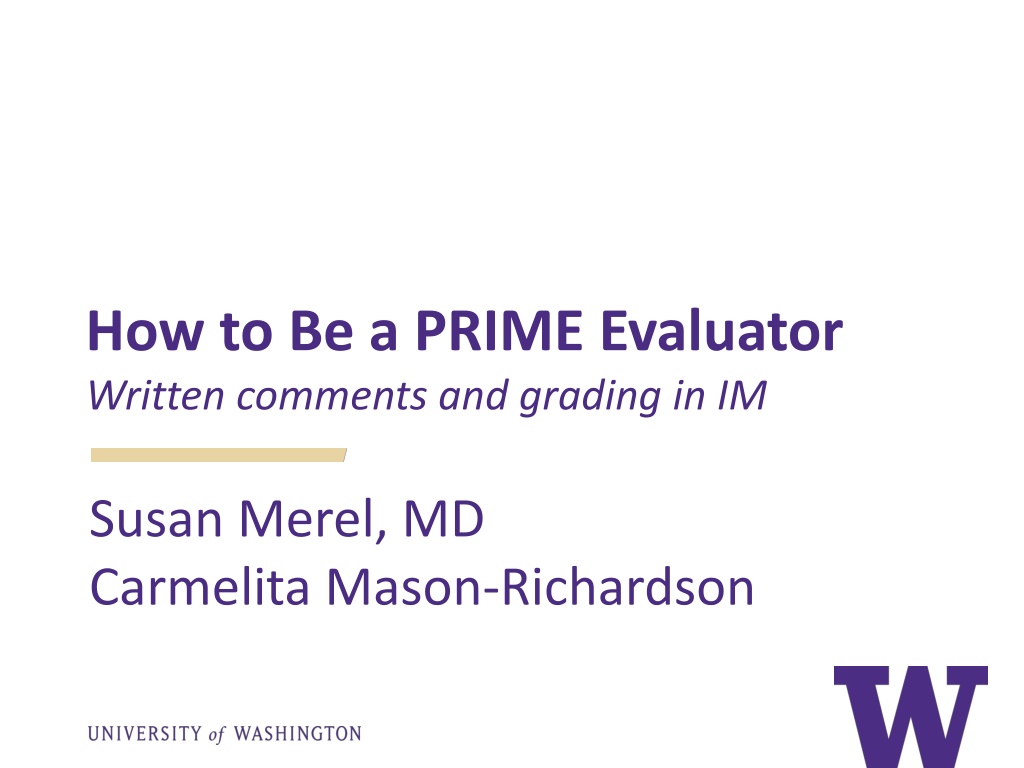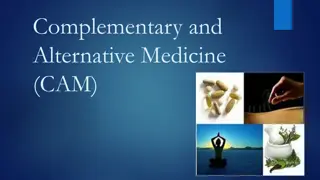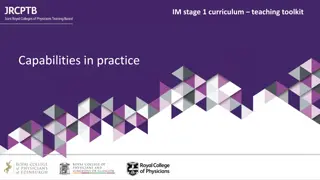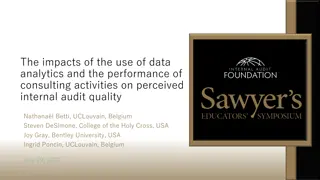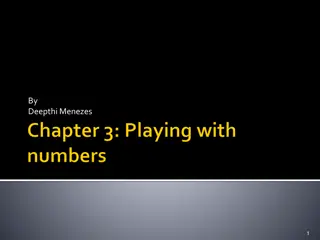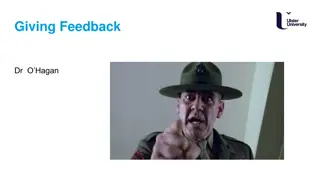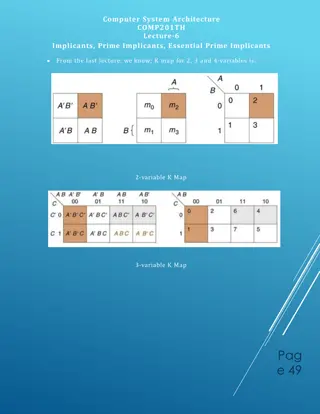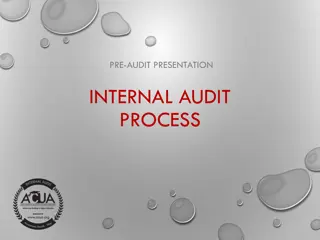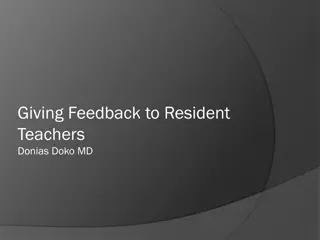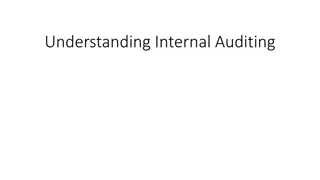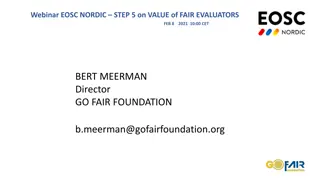Effective Feedback Strategies for Prime Evaluators in Internal Medicine
Learn how to provide constructive feedback using the Prime rubric in Internal Medicine evaluations. Understand the differences between Reporter, Interpreter, and Manager-level students in written comments. Discover the importance of detailed feedback in helping students improve and its role in assessing final grades.
Download Presentation

Please find below an Image/Link to download the presentation.
The content on the website is provided AS IS for your information and personal use only. It may not be sold, licensed, or shared on other websites without obtaining consent from the author. Download presentation by click this link. If you encounter any issues during the download, it is possible that the publisher has removed the file from their server.
E N D
Presentation Transcript
How to Be a PRIME Evaluator Written comments and grading in IM Susan Merel, MD Carmelita Mason-Richardson
Learning Objectives Describe the PRIME rubric and how IM uses it in grading Distinguish between Reporter-, Interpreter-, and Manager-level students in your written comments
How are written comments helpful? Used by student to help improve Record of our evaluation of the student Used in MSPE, department letter, your own personal LOR In IM, can be used in determining final grade
Helpful? (part 1, grade HP) I was delighted to supervise Margo Chen for a week on the General Medicine service at UWMC. She demonstrated an exceptional rapport with her patients, spending countless hours with them before and after rounds, getting to know them as individual people rather than merely as patients. Her patients adored her, and knew that they could depend on her for virtually anything they might need. We expect our medical students to pay attention to details as well as the "big picture," but Margo was truly special in this regard. I believe that her clinical work before medical school has provided her with an exceptional sense of compassion, and a need to "connect" with her patients. This is a rare gift, and she should be commended . . .
Helpful? (part 2) . . . Margo's medical knowledge was right on target, and she was passionate about learning more every day. For example, she cared for a patient who struggled valiantly against a severe case of macrophage activation syndrome; she provided us with a lovely chalk talk about the condition, based on reading she had done and discussions with our consultants. Our medical resident and intern simply adored her and came to rely upon her for her meticulous care. Her "rounding skills" were on target for the beginning of her third year. I do anticipate that her confidence will rise as she gains experience; she is a skillful student and she should let that show, so to speak. I am sure she will become a wonderful physician, and I wish we had more time together.
Helpful? (grade HP) Joe is professional in his behavior and is responsive to feedback regarding the advancement of his clinical skills. Over the course of our two weeks together his reporting skills improved steadily, he was able write great ambulatory notes and give a concise and well organized oral case presentation by the end of time our together. Joe is able to integrate information well and formulate reasonable assessments. He continues to work on development of his management skills. Joe has great communication skills and interpersonal skills, he made my patients feel well-listened too.
PRIME Professionalism Timeliness, honesty, attitude Reporter Gathering info, writeups and oral presentations Interpreter Weighted differential, tests Manager Offers reasonable dx and tx plan Enhanced communication
PRIME (RIME) First described in the literature by Lou Pangaro in 1999 Intention was to improve the credibility of educators descriptive evaluations of students Meant to provide a synthetic approach to the evaluation of skills, knowledge and attitudes with particular attention paid to professionalism. Growing independence is the underlying premise Pangaro L Acad Med 74(11) 1999; Pangaro L Clin Anat 19:419-28 2006
According to Dr. Pangaro . . . Reporter: basic skills to obtain a a hx and do a PE and the basic knowledge to know what to look for; day-to-day reliability. . . Interpreter: ability to prioritize problems identified, and offer a ddx. Has to be an active participant in patient care. Manager: Selecting options and proposing plan; Requires more knowledge, more confidence and more judgement. Requires higher-level interpersonal skills to tailor plan to patient. Pangaro L Acad Med 74(11) 1999
Is PRIME a pyramid? Sort of! Professionalism and reporter necessary for other skills BUT students can have manager and interpreter skills in some contexts and not others
Important elements of strong reporter-level student Oral case presentations and notes are concise, complete Information presented is accurate Can modify presentation to fit setting Notes change appropriately; minimal/appropriate use of copy-paste and EMR importing
Important elements of strong interpreter-level student Strong knowledge base Differential that is reasonable and weighted and supported Able to change differential as clinical course evolves and support changes Ability to interpret testing is a lab change clinically significant?
Important elements of strong interpreter-level student Ability to prioritize problems in the inpatient and outpatient settings Able to assess status of chronic disease visit script for outpt problems Able to zoom in or out if there are issues more important than the presenting problem Why or differential within the differential E.g. yes the patient is dyspneic from a PE, but why does this healthy young person have a PE?
Important elements of strong manager-level student Can defend the plan to the team and explain it to a patient Takes initiative follow up on tests, call for records Triage new problems, take appropriate steps Develop a patient-centered management plan incorporate goals and values into plan, especially on-the-fly as a patient questions a plan
Important elements of strong manager-level student Strong knowledge base Ability to choose/order appropriate testing (not just order everything!) Accurate, nuanced management plan that changes over time e.g get patient ready for discharge, length of antibiotics, monitoring, counseling of side effects
Meaningful Independence For all levels of PRIME: If students need lots of reminders, coaching, help then they probably are not showing meaningful independence This is the biggest determinant of what level they attain
Student who truly manages but has some reporting deficits RARELY there will be a student who is truly managing at a high level but has reporting deficits (this is not common and usually due to anxiety with oral presentations and/or trouble expressing themselves in writing) The grade for this student should be high pass, to reflect that they are truly managing but need to improve some reporting skills
Three aspects of management: 1. Do er Checks off boxes 2. Triager Developing clinical intuition/ sick not sick Recognizes when boxes need to change 3. Executive Suggests and starts to execute new plan of care Defends plan to team Engages with pt in shared decision-making about plan Adapted from Goren E and Kogan J, CDIM national meeting poster 2014
Not just any management plan . . . Snow Day if you can t make it in, can you trust the student to get a safe plan going? This can be a tough area to give feedback in
Written feedback using PRIME Joseph was an absolute joy to work with closely for one week as a subintern on a busy hospitalist service. He was working very solidly at the Manager level on the PRIME system with excellent Professionalism and Enhanced Communication skills. He was extremely capable and thoughtful, able to see patients independently, come up with a fairly nuanced treatment plan and carry it out with appropriate supervision.
Written feedback using PRIME He had excellent clinical judgment given his level of training. He truly excelled in communication with patients and families, even able to run a family conference alone when I was called away to an emergency - when I came back, he had developed excellent rapport with the family and had obtained a very relevant extended social history and started a helpful conversation about the patients' goals of care.
Written comments using PRIME (areas of strength) Jane quickly formulates organized oral case presentations and presented these in the room well. Jane s interpretation skills are quite good, she offers a differential diagnosis for new patient issues and makes accurate assessments of patients' chronic medical conditions. She is beginning to develop her management skills - thinking about what labs and studies are indicated and follow-up on these.
Written comments using PRIME (areas needing improvement) Jane and I discussed continuing to work on efficiency in history collection and managing her time with the patient in the room, mastering her reporting skills. She is working on further developing her management skills, she is beginning to take more ownership of he patient during and following the visit, I would encourage her to continue to do this.
PRIME in grading in IM Reporter = Pass Interpreter = High Pass Manager with Professionalism and Enhanced Communication = Honors Should be at a level consistently (>75%)
Grading for IM portion of WRITE WRITE preceptors asked to fill out eval twice We do not use the benchmarks in grading they are for feedback. Please choose the final grade based on the PRIME rubric Average WRITE grade counts as 50% of clinical grade
Grading for IM clerkship Clinical GPA (50% WRITE, 50% inpatient) NBME IM exam score converted into a number that is added to the clinical grade
Effect of NBME on final grade If clinical GPA is near a final grade cut-off, test score above or below 77 can raise or lower grade one level Test scores below 75 are ineligible for a final grade of "Honors". Test scores 30 or below are a "Fail" score. Students who fail the NBME exam will fail the clerkship.
IM Grading Committee Meets quarterly All IM site directors, all associate directors involved with core clerkship Reviews all students completing clerkship; spends more time on students near a cutoff Decisions made by consensus (sometimes vote) Rely heavily on comments
IM grade distribution 2018-19 Honors 38% High Pass 41% Pass 21%
